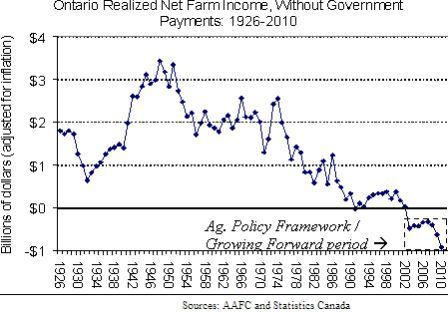DESBORO, Ontario — “Ag. Canada is projecting that 2010 will be the worst year in history for Ontario farmers—worse than the 1930s,” said NFU Ontario Coordinator Sean McGivern. He continued: “A growing number of farm sectors are in crisis: hogs, cattle, and most crops. The 2010 net operating income projection for the average Canadian cattle farm is negative $5,195 while for the average hog farm the projection is just $1,719. Farmers are essentially working on the farm for nothing, while supporting their families with off-farm jobs.”
Agriculture and Agri-Food Canada projections released last week show that Ontario farmers can expect to receive realized net income in 2010 totalling negative 458 million dollars. Worse, the loss is close to one billion dollars, before taxpayer-funded farm support payments of 529 million dollars are included. This is the largest market net income loss ever. The graph tells the story.

McGivern pointed out that since 2003, Ontario farmers’ realized net farm income from the market has been consistently in negative territory. 2003 was the year that Ottawa and the provinces implemented the Agriculture Policy Framework (APF), which was followed up in 2009 by the nearly identical Growing Forward policy. The Federal Government’s policies for deregulation, free trade, corporate mergers, and agriculture, have had drastic results for farmers. Farmers have been watching the prices they receive slide downward, while watching the prices they pay for fuel and many other inputs rise. Farmers have been left with no market power, disruptive global markets, and inadequate government support programs. Between 1996 and 2006, Canada lost 62% of its young farmers under the age of 35. “Unless we rapidly and radically revise the core elements of our farm, trade, and food policies, Canada’s family farms will collapse,” said McGivern.
He concluded: “Canada needs a long-term, integrated food and agriculture policy that connects together complementary solutions to the various aspects of our multi-faceted problem. As we begin to solve individual problems, other problems become more solvable. If we can increase net farm income, we can stop the loss of young farmers. And we can reduce farm stress and injuries. As farms become more prosperous, our rural communities become more vibrant and liveable. Just as bad policies have led to a downward spiral of intensifying problems, good policies can lead to a set of mutually reinforcing solutions. Ag. Canada’s income projections highlight the critical need for change. We need real change Now!
Source : National Farmers Union